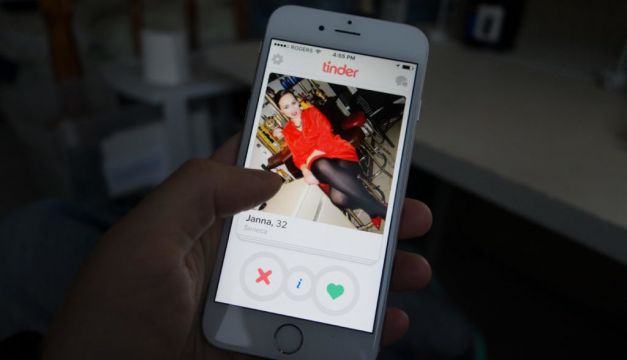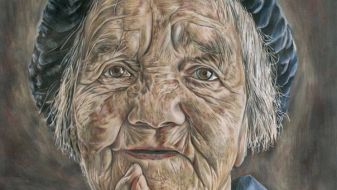Swiping on your phone to find love, lust, friendship and anything in between is such an integral part of life, it’s hard to imagine a time before dating apps.
Tinder celebrates its 10-year anniversary on September 12th, marking a decade since it seismically shifted the way we date.
Dating – once seen as the reserve of IRL meetings or getting set up by your friends – is now firmly in the online world. According to relationship science expert Paul Brunson, the way Tinder has changed romance has “quite a bit of negative, as well as quite a bit of good”.
A new world of possibilities
Tinder has “made online dating mainstream, and that’s something I’m really happy to see”, says Brunson.
He appreciates how the influx of dating apps opens you up to a world of possibilities, saying: “Right now, online dating is the number one source for meeting a significant other… You also have a number of people who are not interested in committed relationships – it could be a casual relationship, it could be a hookup, quick sex – this app does a phenomenal job.”
Dating and relationship coach Sami Wunder (samiwunder.com), who is a self-proclaimed “through and through fan of Tinder”, says the app has positively changed the way we date because of the sheer volume of people – meaning you can find what you’re looking for quickly.
“Tinder really made online dating an absolute must for people who were looking to meet their person fast,” she says. “You can do organic dating, but the kind of impact and message that Tinder came in with, I think it made everyone realise if you’re serious about results, you have to do online dating.”
Brunson agrees with this idea of speed, adding: “There are a lot of people looking for a second chance at love – it could be a spouse who’s passed away, it could be a spouse who’s divorced, so they’re back out in the market. Tinder does make it easy to quickly get back out in the market.”
Plus, Brunson argues the app was a real leader in the field, saying: “You have more apps come out because of Tinder, and that innovates the industry. Ideally, that makes the dating app industry more efficient, and more effective.”
Spoiled for choice?

This explosion of choice comes with its own set of challenges. “I think the number one issue with Tinder, and dating apps in general, is it’s created an illusion around the number of potential daters you can have, and it’s decreased the satisfaction each person has with each option,” Brunson says. He refers to it as a “paradox of choice”, taking the phrase from psychologist Barry Schwartz.
“People jump onto Tinder or other dating apps, and they believe they have thousands or hundreds of thousands or millions of potential options. Therefore when they are able to make one choice, there’s less satisfaction with that choice, and it becomes more disposable. Therefore there’s less effort, there’s less energy, there’s less care that goes into that particular match. That’s something that quite honestly is devastating.”
Wunder also accepts that choice can be a double-edged sword. “Dating is far more overwhelming for a lot of people,” she explains. “I think choice is empowering, but choice can also be overwhelming. In my clients, I see they have a fear of settling sometimes, because there’s one great option – then there’s another great option available.”
She suggests choice can spark more indecisiveness: “It can lead people to be non-committal, because you always feel like you can have it better.”
Reducing dating to looks

Over the past decade, dating has become increasingly gamified – you’re swiping on a phone, spending only a split second on each decision.
For Brunson, this has brought about a crisis in self-esteem. “According to research I’ve done, I would say anywhere from about 90 to 97 per cent of the decision to match with someone is purely based on their photos. So if you’re thinking about your photos, and you’re not being matched, you’re not having people swipe right on you, that begins to take a toll on your self-esteem,” he says.
And this emphasis on photos “diminishes all the other facets that go into physical attraction”, says Brunson, “whether that be scent, body movement, sound of voice. It definitely diminishes – if not destroys – all the other aspects that make someone the beautiful character they are – their experiences, their values, their education, their geography – all those things. It diminishes all of those, and puts the emphasis on the photo.”
And what about allegations of a rise of racial discrimination in dating, due to the superficial nature of apps? Brunson isn’t convinced this is down to online dating.
“One thing we have to be very frank and honest about is, especially when you get into the older millennial [generations] plus, ethnicity is the number one characteristic we use to determine if we want to match with someone,” he says. “So what the app does is makes it efficient for that to happen.” Some apps have even had an ethnicity filter (although Tinder has never had this function).
“I think it’s on us as humans to not blame that on an app, or not blame it on technology. I’m not going to blame that on Tinder – I’m going to blame it on how you were raised.”
Encouraging short-term hookups
Has the rise of app-based dating changed how we approach love and relationships? While there’s nothing wrong with casual hookups, the experts suggest the emphasis has shifted away from serious relationships over the last decade.
“Not everyone, but so many of us have forgotten that a relationship actually takes time, effort, commitment, investment – we are moving away from that, into more instant gratification, and we just want to swipe click, meet, have sex,” muses Wunder.
“I think this leads to a culture of more loneliness and more numbness in our emotions, and more emptiness – at the end of the day, if you’re not giving, if you’re not investing, if you’re not really getting to know somebody, there is no real relationship being formed there.”
While Wunder doesn’t think dating has completely descended into one-night stands and meaningless hook ups (instead, she thinks the apps are just a “reflection of the real world we live in”), she does see a lot of her clients “exhausted and burnt out from dating” because not everyone is looking for meaningful connections.
Brunson agrees, and puts this down to the nature of online dating. “Tinder is the optimal app for short-term mating – that’s quick sex, casual relationships with many people – whether those are sexual or not,” he says.
“But when it comes to long-term mating, when you’re looking for a commmitted partner, when you’re looking for a spouse, it becomes terrifically hard” – because of this “over-emphasis on the physical, on just the photo, and de-emphasis on all these other pieces that, quite frankly, are much more important when it comes to a long-term partner”.







